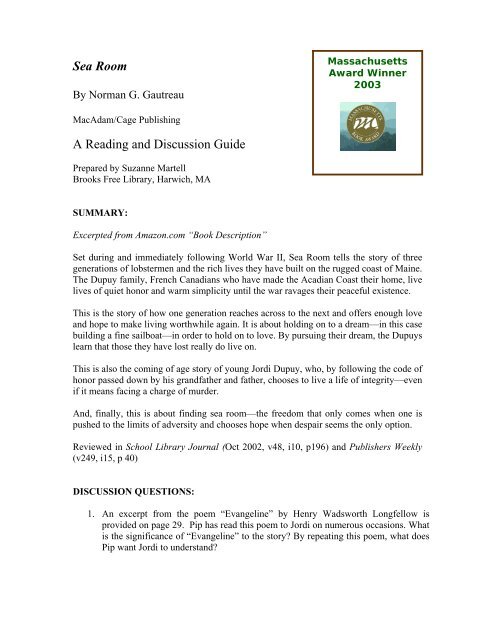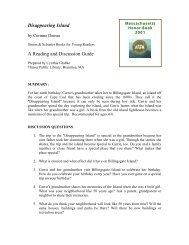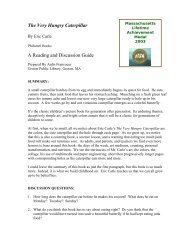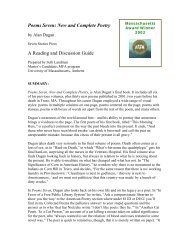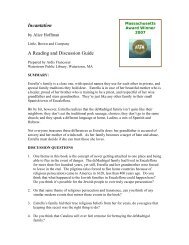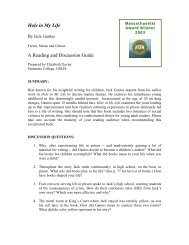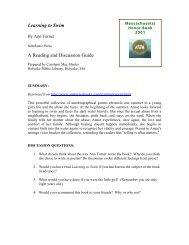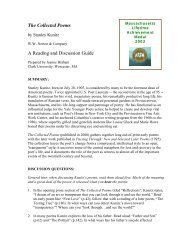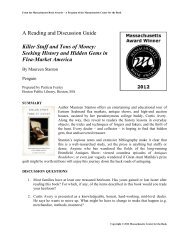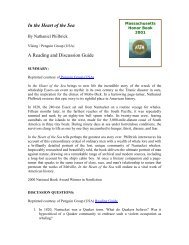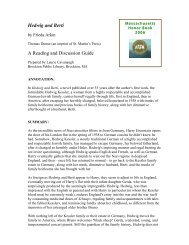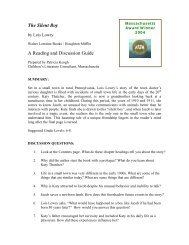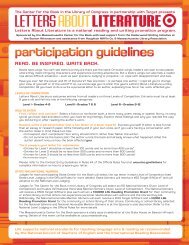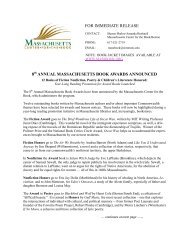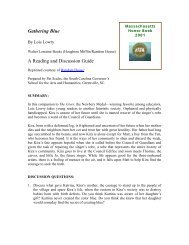Sea Room A Reading and Discussion Guide - Massachusetts ...
Sea Room A Reading and Discussion Guide - Massachusetts ...
Sea Room A Reading and Discussion Guide - Massachusetts ...
You also want an ePaper? Increase the reach of your titles
YUMPU automatically turns print PDFs into web optimized ePapers that Google loves.
<strong>Sea</strong> <strong>Room</strong>By Norman G. Gautreau<strong>Massachusetts</strong>Award Winner2003MacAdam/Cage PublishingA <strong>Reading</strong> <strong>and</strong> <strong>Discussion</strong> <strong>Guide</strong>Prepared by Suzanne MartellBrooks Free Library, Harwich, MASUMMARY:Excerpted from Amazon.com “Book Description”Set during <strong>and</strong> immediately following World War II, <strong>Sea</strong> <strong>Room</strong> tells the story of threegenerations of lobstermen <strong>and</strong> the rich lives they have built on the rugged coast of Maine.The Dupuy family, French Canadians who have made the Acadian Coast their home, livelives of quiet honor <strong>and</strong> warm simplicity until the war ravages their peaceful existence.This is the story of how one generation reaches across to the next <strong>and</strong> offers enough love<strong>and</strong> hope to make living worthwhile again. It is about holding on to a dream—in this casebuilding a fine sailboat—in order to hold on to love. By pursuing their dream, the Dupuyslearn that those they have lost really do live on.This is also the coming of age story of young Jordi Dupuy, who, by following the code ofhonor passed down by his gr<strong>and</strong>father <strong>and</strong> father, chooses to live a life of integrity—evenif it means facing a charge of murder.And, finally, this is about finding sea room—the freedom that only comes when one ispushed to the limits of adversity <strong>and</strong> chooses hope when despair seems the only option.Reviewed in School Library Journal (Oct 2002, v48, i10, p196) <strong>and</strong> Publishers Weekly(v249, i15, p 40)DISCUSSION QUESTIONS:1. An excerpt from the poem “Evangeline” by Henry Wadsworth Longfellow isprovided on page 29. Pip has read this poem to Jordi on numerous occasions. Whatis the significance of “Evangeline” to the story? By repeating this poem, what doesPip want Jordi to underst<strong>and</strong>?
2. Compare <strong>and</strong> contrast similarities <strong>and</strong> differences between Acadian or Franco-American culture <strong>and</strong> that of “mainstream” America during the time of WWII.3. Discuss the joys <strong>and</strong> sorrows experienced by the family as Gil goes to war. How didindividual characters react to Gil’s death in combat?4. The “Book of Job” from the Bible is mentioned or quoted numerous timesthroughout <strong>Sea</strong> <strong>Room</strong>. Discuss some of the similarities <strong>and</strong> differences between thestory from the Bible <strong>and</strong> the story in <strong>Sea</strong> <strong>Room</strong>. How does having read the chapterin the Bible add to the underst<strong>and</strong>ing of some of the characters in <strong>Sea</strong> <strong>Room</strong>?5. How did individual family members deal with Pip’s impending death from cancer?What range of emotions were felt as he neared his death?6. Why is it essential that Jordi finish the boat before Pip dies? Talk about how it mayhave been different if Pip or Gil had not died.7. Compare <strong>and</strong> contrast the differences in spiritual belief between Pip <strong>and</strong> Nana. Howare they similar or different to your own faith.8. What does Pip mean by “sea room”? Discuss a few instances where it is mentionedby different characters <strong>and</strong> what it means for each individual. Provide an examplefrom your own life where you could have used some “sea room”.ACTIVITIES:Research the following topics as you prepare to discuss <strong>Sea</strong> <strong>Room</strong>:Acadian <strong>and</strong> Franco-American CultureDown East Maine cultureHenry Wadsworth Longfellow’s poem, “Evangeline”The “Book of Job” from any version of the Old Testament in the BibleThe history of boat building in MaineThe Penobscot Bay area of Maine
BACKGROUND INFORMATION:Reprinted from www.nggautreau.comMessage from the Author: Have you ever asked yourself, "Now where did that thoughtcome from?" Creative ideas are the result of a collision among two or more previouslyunrelated experiences, events or ideas. With fiction, I think many ingredients get throwninto the mixing bowl, some of which lurk secretly in the deepest recesses of the author'smind, <strong>and</strong> it is often difficult to trace the origin <strong>and</strong> evolution of a story.Not so with <strong>Sea</strong> <strong>Room</strong>. A theme that has always intrigued me—how some people takeaction, even in the face of overwhelming events, while others remain passive victims—forms a basis of this book. And with that as a grounding, I can trace almost precisely themany thoughts <strong>and</strong> impressions which contributed to <strong>Sea</strong> <strong>Room</strong>'s story line.Thirty years ago I wrote a short story involving a gr<strong>and</strong>father, a gr<strong>and</strong>son <strong>and</strong> a boat.However, I then became consumed by the corporate world <strong>and</strong> nothing ever came of it.Not a sentence of that story appears in <strong>Sea</strong> <strong>Room</strong>. Nevertheless the germ of the idea—gr<strong>and</strong>father, gr<strong>and</strong>son, boat—simmered in my brain <strong>and</strong> every so often I said, "Youknow, you ought to do something with that story." Also other stories began floatingaround in my mind. So, eventually I walked away form a lucrative career as amanagement consultant, made the difficult adjustment to a much simpler life, <strong>and</strong>, quitesimply, wrote,Then one day, while in the Berkshires, I visited the Norman Rockwell museum where Isaw a painting called Outward Bound. You may have seen it—an old man <strong>and</strong> a youngboy st<strong>and</strong> gazing out at a sailing ship. The old man is bent at his waist. The boy has awistful posture. <strong>Sea</strong>gulls spiral overhead. The day is sunny but not for long; ominousclouds are massing.The night before seeing that painting I was reading Stephen Ambrose's book about the D-Day l<strong>and</strong>ings. So as I stood gazing at the painting I wondered what if, out beyond thehorizon in the picture, troops were l<strong>and</strong>ing on Omaha Beach. Questions naturallyfollowed: who was the old man? The boy? Was someone they knew—the son of one; thefather of the other—l<strong>and</strong>ing on the beach? And with that simple convergence of ideas,the characters of Pip, Jordi <strong>and</strong> Gil were born <strong>and</strong> a story started to take shape.This stirred my interest in what we've come to call the "Greatest Generation." So Ilistened to music from WWII (music often inspires me) <strong>and</strong> the temper of the book beganto emerge. For example, the character of Lydie, the young wife bravely enduring thepainful absence of her husb<strong>and</strong>, came almost fully rounded from Jo Stafford's song "I'llBe Seeing You". The song "Is You Is or Is You Ain't My Baby?" remarkably deliveredup a sketch of the character Nana, the feisty <strong>and</strong> deeply religious mother who declareswar on her son's enemy through Victory Gardens <strong>and</strong> scrap drives <strong>and</strong> who intercedeswith God to spare the life of her only remaining child.
I immersed myself in books about the period. I read stories. I talked with my French-Canadian relatives. I listened intently to my mother-in-law who met her future husb<strong>and</strong>on D-Day in a hospital in Engl<strong>and</strong> where they worked, waiting for casualties from thebeaches. My wife <strong>and</strong> I toured the coast of Maine looking for a setting <strong>and</strong> fell in lovewith the Blue Hill peninsula. We spent a great deal of time doing local research. I readall the essays of E.B. White who lived there. I even took a course in half-model carving<strong>and</strong> studied wooden boat building.So I stirred all these ingredients—my love of take-charge people, my long-ago shortstory, the Rockwell painting, the Ambrose book, WWII music, family stories, the coast ofMaine, boat building—into the pot of my writer's imagination <strong>and</strong> out came <strong>Sea</strong> <strong>Room</strong>.HELPFUL LINKS:Author’s website (contains a wealth of information about <strong>Sea</strong> <strong>Room</strong>) www.nggautreau.comReview of <strong>Sea</strong><strong>Room</strong> www.bookreporter.com/reviews/1931561079.aspThe <strong>Massachusetts</strong> Book Awards are a program of the <strong>Massachusetts</strong> Center for theBook, the Commonwealth Affiliate of the Center for the Book in the Library ofCongress. Visit us on the web at www.massbook.org.Copyright © 2004 <strong>Massachusetts</strong> Center for the Book


